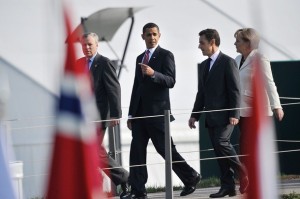 Photo: from left to right, (Former) NATO General Secretary Jaap de Hoop Scheffer, U.S. President Barack Obama, French President Nicholas Sarkozy and Germany’s Chancellor Angela Merkel at the NATO Summit 2009. Photo Credit: Getty Images
Photo: from left to right, (Former) NATO General Secretary Jaap de Hoop Scheffer, U.S. President Barack Obama, French President Nicholas Sarkozy and Germany’s Chancellor Angela Merkel at the NATO Summit 2009. Photo Credit: Getty Images
The North Atlantic Treaty Organization (NATO), found cause to celebrate this year: On Apr. 4, 1949, the collective defense alliance was founded in Brussels on the eve of the Cold War. Sixty years later and now with 28 member states – Croatia and Albania were formally accepted this year – the organization set out to redefine its role after the collapse of communism 20 years ago.
For the first time, the annual NATO Summit was jointly hosted by two member states, France and Germany, whose “close partnership during the course of NATO’s history symbolizes a vision of a Europe whole and free,” according to the NATO website. Following the Summit, member countries’ leaders called for a new doctrine, as the previous one of 1999 neither reflects the changes in Russia nor takes global terrorism – like the 9/11 – into account.
The 60th anniversary also marked the return of France to the allied command structure – a move hailed by members, though deeply controversial within France. French President Nicholas Sarkozy defended his decision by saying that now was time for change:
“Our strategy cannot remain stuck in the past,” he urged at a talk at France’s Strategic Research Foundation in mid-March, “when the conditions of our security have changed radically.” France, Sarkozy argued, will have more influence in NATO missions while the independence of the nuclear-equipped French military will remain untouched.
But all seems well without NATO for Austria, now surrounded by alliance members, except Liechtenstein and Switzerland. The dramatic NATO membership plea by news magazine profil journalists Gernot Bauer and Georg Hoffmann-Ostenhof in the article ‘Holt uns da rein!’ (‘Get us in there!’ Apr. 6 edition) did not, however, spark any further political debate. All political parties seem happy to remain neutral, including those who once argued for NATO membership. Read the rest of this entry »



